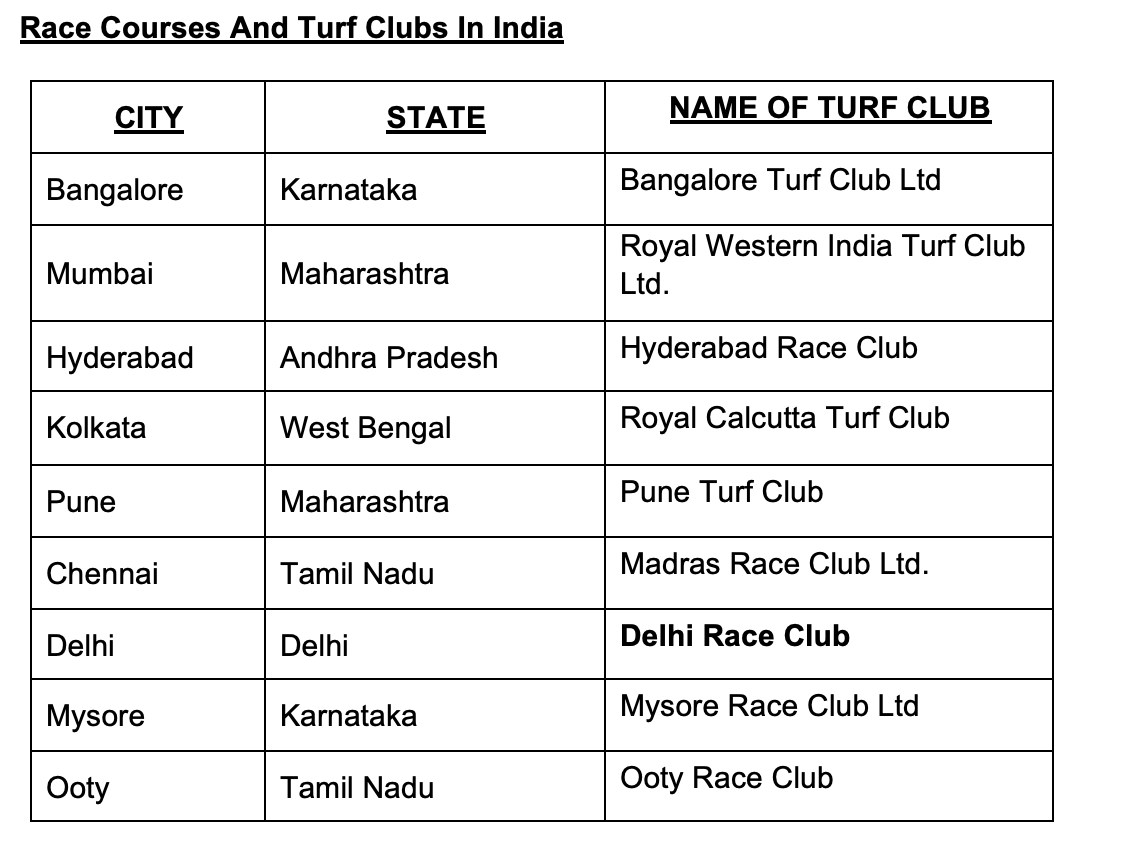
PROFILE AND BACKGROUND OF THE SPORT AND TURF CLUBS
1. Horse racing in India boasts a rich history, dating back centuries and weaving through the diverse cultural fabric of the nation. This article provides a comprehensive overview of the sport and its operations
2. Horse racing is the only sport under which gambling is legally allowed in India as it is regarded as a “game of skill” under the purview of the Central “Public Gambling Act 1867”
3. As with the gaming industry as a whole, the sport is state controlled for providing state approval to operate
4. All the clubs have been in existence for at least over a century from the time of the British Raj. Madras (Chennai) is the oldest club having been established in 1777
5. All the clubs except for Hyderabad do not own their own land. Most of these turf clubs are on army owned or government owned land on a lease basis.
6. The tables below provides a snapshot of the turf clubs, race days and races which take place in the country as follows
· Race Courses and Turf Clubs in India
· Races Details for Each Major Club Per Year
· Big Races in The Year


Race Details And Race Days Details
- Racing occurs in 330 days of the years with the overall number of race days being 445 (as two tracks may have racing on the same day)
- There are 107 Classic and Graded races across the country over the year
- Some of the Classic races are:
- Derby
- Guineas
- Oaks
- Gold Cup
- There is also the Annual Invitation Cup which is held by rotation at each of the major clubs.
- All the clubs are controlled by a committee who are the de-facto “Board of Directors” who are respected and active people in the industry.
- There is a central body for the sport called the “Turf Authority of India” (TAI). The head of the authority is an honorary post taken in rotation by the clubs. TAI is responsible for enforcing the rules and regulations, ensuring fair competition, and protecting the welfare of horses and participants alike. It serves as the backbone of the regulatory framework, guiding the sport’s operations across the country
- There is also a nodal agency for all matters concerning registrations of breeding establishments and recording of all thoroughbreds in India called the Stud Book Authority of India (SBAI). The SBAI is governed by the committee of the Mumbai Turf Club.
- Each club operates autonomously. However, there are quarterly meetings held between the clubs and as coordinated by the Secretary of TAI to decide on industry policy and international regulatory coordination
- As can be seen from the number of clubs are very limited. There used to be a larger number of clubs but during the course of time they have closed due to lack of commercialisation and monetisation
- Clubs have been keen to set up off-course betting centres but there have administrative and regulatory challenges faced
- There are over 70 registered stud farms throughout India.
CURRENT INITIATIVES OF THE CLUBS
- Up until Covid, if you wanted to wager on a race, one had to actually do it off- line at the racecourse itself. The clubs have realised the limitation this creates, and online wagering is now permitted but has not been properly implemented or promoted by the clubs
- Until recently the clubs all operated their own tote and were reluctant to have a commingled national tote (for various reasons). The clubs have now taken the decision that a commingled tote would be beneficial but again implementation is lacking
- The clubs are now actively promoting membership and participation by the younger generation by providing attractive terms for the younger generation to become members
THE HIDDEN OPPORTUNITY
Given the above, there are various opportunities which exist to enhance the sport and its popularity:
- Horse racing still enjoys the monopoly of being the only sport in India where sports betting is allowed
- Introduction of new racing and gaming products within the sport
- Improved IT both in terms of hardware and software
- Implementation of Commingling of the totes at all the clubs both off-line and online
- Improved marketing and PR for wagering and as a place of entertainment to the mass Indian market both in terms of gaming community and the general public
- Increased International racing coverage
- Setting up of new Turf Clubs in states which are void of a race track







